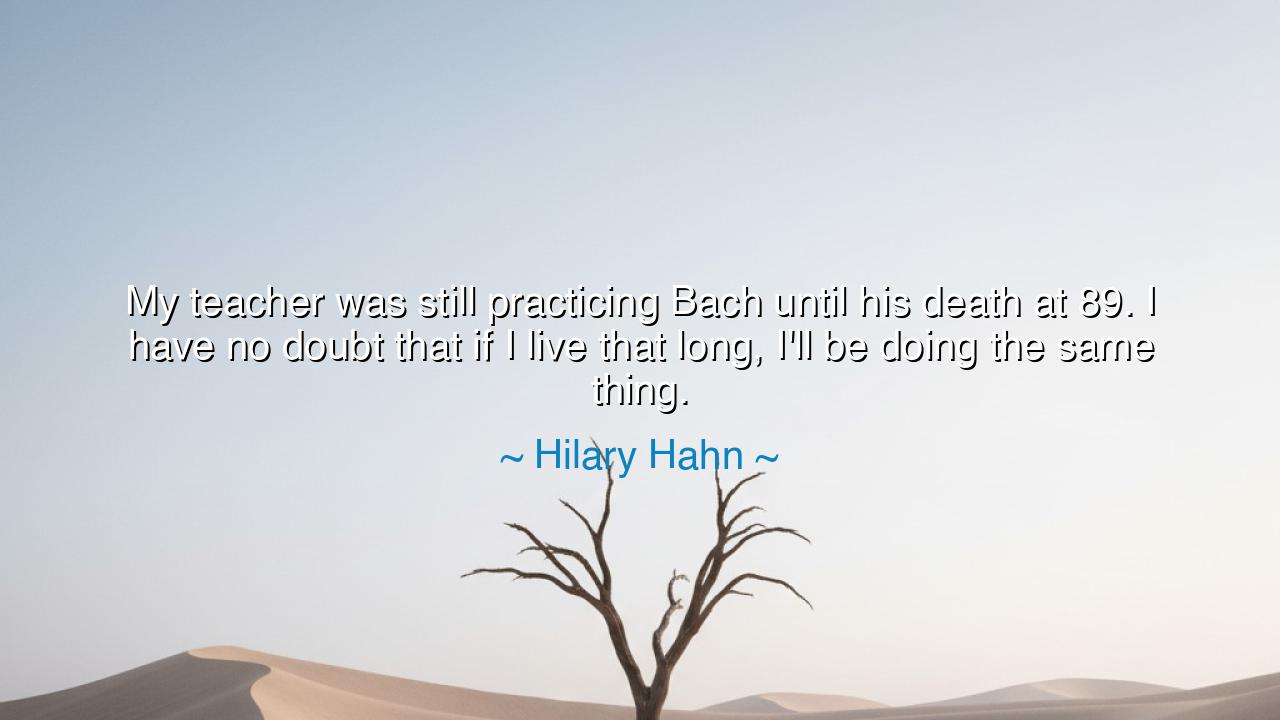
My teacher was still practicing Bach until his death at 89. I
My teacher was still practicing Bach until his death at 89. I have no doubt that if I live that long, I'll be doing the same thing.






“My teacher was still practicing Bach until his death at 89. I have no doubt that if I live that long, I'll be doing the same thing.” Thus spoke Hilary Hahn, the violinist whose art is both discipline and devotion. In her words shines a truth that transcends music: that mastery is not a destination but a lifelong journey, and that true love of craft does not fade with age but deepens, becoming a companion until life’s final breath.
The meaning of this saying lies in the eternal union between student, teacher, and art. Hahn honors her teacher, who, even at the threshold of ninety years, still bent his soul to the works of Bach. It was not compulsion that drove him, nor ambition, but devotion—the desire to keep exploring the infinite depths of music. For the works of Bach are not mastered in a lifetime, but endlessly reveal new mysteries. By saying she too will continue this practice until her last day, Hahn affirms that art is not conquered by achievement, but lived as devotion.
History mirrors this devotion in many ways. Consider Michelangelo, who, in his final years, still carved and sketched, declaring, “I am still learning.” Even after shaping the Pietà and the Sistine Chapel, he did not imagine himself complete. Or recall Pablo Casals, the great cellist, who at age ninety-three still practiced daily, saying, “I am making progress.” These lives embody the truth Hahn expresses: that true greatness is humble before the infinite, and never ceases to learn, never ceases to practice.
The origin of Hahn’s words springs from her immersion in the classical tradition, where music is not only performance but pilgrimage. To practice Bach is to walk a path laid centuries ago, a path both technical and spiritual. For Bach’s music, with its order, beauty, and hidden architecture, is more than notes on a page; it is a mirror of the soul, a meditation on existence. Hahn’s teacher knew this, and so did she: to practice Bach until death is to remain in conversation with something eternal.
There is heroism in such perseverance. In a world that prizes quick success and fleeting applause, the image of an elder at ninety still practicing is both humbling and inspiring. It teaches us that the true artist does not serve glory, but the craft itself. The applause fades, but the practice remains. To live this way is to make art a companion, not a career; a discipline, not a trophy. Hahn’s vow is therefore not a boast, but a promise to remain faithful to the path of her teacher, and to the music that has claimed her soul.
The lesson for us is profound: whatever your calling—be it music, writing, teaching, or any noble work—do not think of mastery as an end. Think of it as a practice that lasts until your final day. Let your devotion grow deeper with time, until the work itself becomes your daily meditation, your prayer, your anchor. And when you are old, may others look upon you and say: they did not stop, they kept walking the path, faithful to their art until the end.
Therefore, dear listener, remember Hilary Hahn’s testimony. Do not abandon the disciplines that shape your spirit. Choose something noble—be it music, craft, or service—and remain faithful to it. For it is not in the applause, nor in the titles, but in the daily practice, carried into the twilight of life, that the soul finds its true greatness. And when the end comes, may you too be found still practicing, still learning, still devoted—like her teacher, like herself, like all who know that the journey of mastery is also the journey of the soul.






AAdministratorAdministrator
Welcome, honored guests. Please leave a comment, we will respond soon